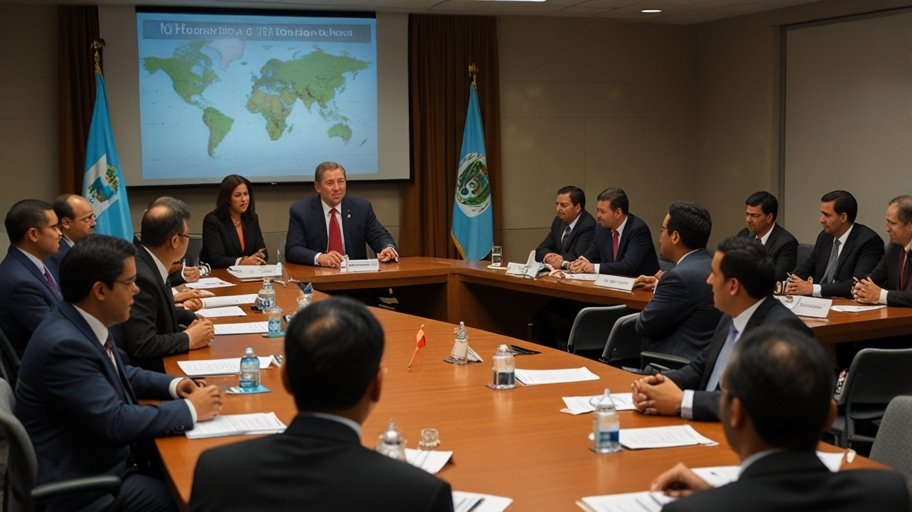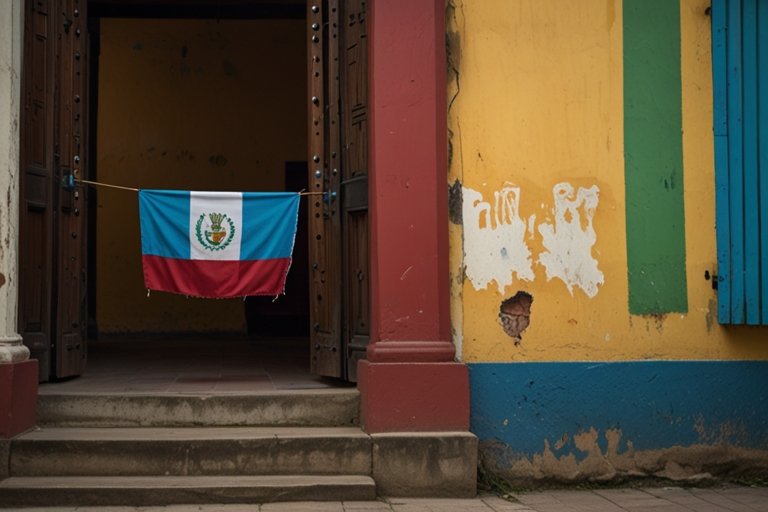Guatemala, Central America’s most developed economy, boasts a magnificent cultural and historical heritage whose origins date back to ancient civilizations, colonialism, and the contemporary crusade for democracy. Strategically located between Mexico, Belize, Honduras, and El Salvador, Guatemala occupies a very special role in Latin America. Over time, Guatemala’s foreign policy has seen a shift in orientation through the complexities of regional and global geopolitics, with balancing interrelation with near neighbours while seeking to take on major international actors such as the United States, the European Union, China, and global organizations. This article reviews Guatemala’s foreign policy focusing on its regional commitments in Central America, its relationship with key global players, and its diplomatic efforts to strengthen its international position.
Historical Background of Guatemala’s Foreign Policy
Guatemalan foreign policy is developed on the colonial history, the Cold War, and the process of democratization that this country has been through. It became independent from Spain in 1821, and, like most Latin American countries, it was doomed to a long-lasting internal instability, economic challenges, and outside interference. At the end of the 20th century, Guatemala lived through a number of authoritarian regimes that ended with a brutal civil war lasting from 1960 to 1996.

Foreign policy was mainly framed during the Cold War by Guatemala’s relationship with the United States, which regarded the country as an important piece in its strategy to contain communism in Latin America. The infamous CIA-backed coup of 1954, which overthrew democratically-elected President Jacobo Árbenz, well exemplified how Guatemalan decisions on foreign policy were made under the shadow of US influence. The coup marked the beginning of decades of military dictatorships and instability, during which Guatemala aligned itself closely with US anti-communist policies.
However, signing of 1996 Peace Accords, which terminated the 36 years protracted civil war, set a turning point in the foreign relations of Guatemala. The country started to rediscover its sovereignty and gain a more independent foreign policy, yet retaining the strength in relationship with the United States and in its neighborhood. Post-civil war Guatemalan foreign policy has taken an interest in encouraging democracy, human rights, as well as enhancing economic development both on its soil and in the region.
Regional Diplomacy: Central America and Beyond
Regional diplomacy is an integral part of Guatemala’s foreign policy, because the role this country plays in Central America. Being a member of Central American Integration System, SICA, Guatemala has shown much activity in terms of promotion of regional integration, cooperation in economic matters, and peace issues. SICA is formed in 1991 and includes the seven countries of Central America and the Dominican Republic. It will play a crucial role for the continent by building consensus on both economic and security aspects and environmental sustainability.
Regional Security and Migration
Guatemala foreign policy on the regional level is highly dominated by the serious security issue. For decades, the Northern Triangle of Central America, consisting of three countries namely, Guatemala, Honduras, and El Salvador, has experienced considerable violence and drug trafficking, majorly linked to gang-related crimes. These security matters have greatly affected regional stability, as well as migration. In addition, it has brought mass migration, as thousands of Guatemalans are leaving the United States and Mexico for safety and more readily available opportunities every year.
Guatemala has looked for partnership with neighboring and international powers to fight at the grass root level causes of migration and promote regional security. In 2019, Guatemala signed a highly controversial “Safe Third Country” agreement with the United States, forcing asylum seekers transiting through Guatemala to first seek asylum in that country before continuing with their claims in the US While under siege from multiple criticisms and legal challenges, the agreement underscored Guatemala’s complex relationship with the US and the implications migration has for its foreign policy.
In addition, the country has been part of regional security initiatives such as the Plan of the Alliance for Prosperity in the Northern Triangle, a program launched and funded by the US government in its pursuit of reducing migration rates by addressing the root causes of poverty, violence, and corruption that plague the region. The country’s involvement in such efforts shows its willingness to engage regional partners in the enhancement of safety and security.
Economic integration and trade
The second significant aspect of regional foreign policy of Guatemala is economic integration. Guatemala has always advocated for deep economic cooperation by Central American nations. Having originally been part of SICA, the country would now engage even further in Central America, hence its presence within the Central American Common Market of 1960, an early attempt to coax regional economic integration. Despite the various challenges the CACM had to face, especially during the civil conflicts in the 1980s, Guatemala has maintained interest in reviving the common market and enhancing intraregional trade.
Foreign Policy
Guatemala’s foreign policy has focused on expanding the country’s trade relations beyond Central America. To expand its trade relations, Guatemala has entered into free trade agreements (FTAs) with various nations and regional blocs, including the United States and Mexico.

Among such countries are Costa Rica, the European Union, and South Korea. For instance, major trade agreements include the Dominican Republic-Central America Free Trade Agreement, signed in 2004, whereby Guatemala and the United States among other Central American states agreed. This type of agreement has increased exports to the US, and attracted foreign investment, but it has also faced criticism, this time due to negative impacts on local sectors of industries and farmers producing agriculture goods.
Bilateral Relations of Central America
Beyond multilateral initiatives, Guatemala has developed strong bilateral relationships with its Central American neighbors. Guatemala-Mexico relations have flourished over the decades, significantly expanding in the areas of trade, migration, and border control. The country has a long border of km; cooperation on border control has been key in discussing problems related to migrant flows and issues due to drug trafficking and organized crime.
The country has strong diplomatic and economic ties with Honduras and El Salvador. On the same grounds, there is a common formidable challenge facing the three countries: poverty and its perils such as violence and emigration. In this regard, there have been efforts toward closer cooperation in security, trade, and infrastructure development. Such examples include the customs union between Guatemala and Honduras, which subsequently included El Salvador, to facilitate trade and better facilitate economic cooperation by removing border delays and tariffs.
Environmental Diplomacy
Environmental issues, especially concerning climate, deforestation, and biodiversity loss, have increasingly formulated the regional foreign policy in Guatemala. The country is very vulnerable to natural disasters such as hurricanes, floods, or droughts. Guatemala thus has a big interest in fostering regional cooperation on climate resilience and environmental protection. Being largely prone to the impacts of climate change, the Central American region, Guatemala has found itself participating in several regional initiatives to combat the effect.
For example, its participation in CCAD- Central American Commission on Environment and Development can be named wherein policies concerning the environment for the region are harmonized, and also sustainable development promoted. Secondly, Guatemala has been working alongside international counterparts in exploring the avenue of climate financing and adaptation as well as accessing technical assistance from some mitigation projects. This is evidence enough of how in such attempts, the now increasing understanding by the foreign policy group of the Guatemalan establishment comes out as seeing the need for collective action to environmental challenges which are inherently transnational in nature.
Global Relations: Engaging Major Powers and Multilateral Organizations
Guatemala’s foreign policy is so overtly concentrated on regional issues, but it cannot avoid international attention. It would thus be expected to be seen in diplomatic relations with significant states like the United States, China, and the European Union; further, one must consider its participation in international organizations, such as the United Nations, the Organization of American States, and the World Trade Organization.
A Special Relationship: The United States
Relationship with the US is amongst some of Guatemala’s very important foreign policy issues. For decades, the US has been Guatemala’s largest trading partner, main source of foreign aid, and a significant force in shaping its domestic and foreign policy. Since the time of the Cold War, Washington continues to hold an important place in Guatemala’s political and economic map even after the post-Cold war period.
The three main pillars of the US-Guatemala relationship are migration, trade, and security. As I discussed above, Guatemala remains one of the most significant sources of migrants for the United States, and US foreign policy has often been focused on reducing irregular migration in order to solve this problem. Other programs – such as the Biden plan for addressing root causes of migration in Central America – represent the strong interconnection between domestic policy issues in both countries.
On trade, CAFTA-DR has acted as a basis for economic interaction between both nations. US enterprises are the main investors in Guatemala, especially in manufacturing, agriculture, and mining areas. However, at times labor rights and environmental degradation have affected the two countries’ economic ties.
Despite these challenges, the strategic role played by the partnership with the United States remains explicitly clear. The country will rely on the use of US political support in international forums and benefits from security cooperation-from combat to drug trafficking and transnational crime among others.
European Union: Trade and Human Rights
The relationship that Guatemala has with the European Union is mainly based on trade and development cooperation. One of Guatemala’s main trading partners is the EU, having entered into an EU-Central America Association Agreement in 2012; the agreement emphasizes trade increase, political dialogue, and cooperation between the two regions. It is through this agreement that trade flows have increased between Guatemala and the EU, especially in the agricultural sector, while some products exported from Guatemala have entered European markets, including coffee, bananas, and sugar.
But the relationship of the EU with Guatemala is broader than just that of a trader. European countries have been at the forefront of demanding human rights, democracy, and rule of law in Guatemala. EU development aid in Guatemala has also involved governance reforms, civil society enhancement, education and health improvement. The EU has also had problems concerning issues such as corruption, impunity, and indigenous peoples’ rights in Guatemala, and some of those issues have sometimes caused tension between both parties involved.
The China-Taiwan relationship is quite a sensitive and emotive issue. Relations remain frosty but are slowly improving because of the pragmatic economic agreements reached by the two parties.
Probably, one of the most controversial topics in the foreign policy of Guatemala is relations with Taiwan and China. Guatemala is one of the world’s few countries with formal diplomatic ties maintained towards Taiwan, not with the People’s Republic of China. Such a relation has historical roots that dig deep into being one of the strongest supporters of Taiwan at an international level.
However, China’s rapidly growing economic influence in Latin America during the last decade or two threatens the foreign policy of Guatemala. Costa Rica, Panama, and El Salvador followed Taiwan with a switch in diplomatic recognition in exchange for economic incentives, but Guatemala has thus far defied this trend. According to the Guatemalan government, their friendship with Taiwan has been in place since well before the opening with Taiwan, as well as a desire to continue using Taiwan as a leading development partner.
However, China’s economic attractiveness is still very attractive. Infrastructure projects, loans, and trade agreements have always attracted the interest of many countries in Latin America, even Guatemala. For maintaining diplomatic relations with Taiwan, Guatemala has “engaged economically with China in a trade investment balance of political commitments with pragmatic economic interests”.
Involvement in Multilateral Organizations
Another important aspect of Guatemala’s foreign international policy is its activity in international organizations. Being a UN member, the country was involved in all discussion on issues regarding peace and security. In 2012-2013, it served as a non-permanent member on the United Nations Security Council and took part in various discussions, including the Syrian civil war, non-proliferation of nuclear weapons, and the Israeli-Palestinian issue.
It is also a member of the Organization of American States (OAS), where it has advocated for democracy, human rights, and regional security. In recent years, the OAS has been involved in mediating political crises in several Latin American countries, and Guatemala has supported these efforts while also seeking to strengthen its own democratic institutions.

Conclusion
Guatemala’s foreign policy reveals its need to balance regional and global relations. Deeper inter-linkages with its Central American neighbours have led Guatemala to focus more on regional security cooperation, economic integration, and environmental cooperation. Simultaneously, it further aims to preserve strong bilateral relations with major powers like the United States and the European Union and to maintain the delicate balance in its relations with Taiwan and China.
Navigating those relationships does much to tie Guatemala to harder domestic concerns, such as poverty, violence, and migration, with equally more extensive implications for its foreign policy. Development in the future for Guatemala in terms of relations around the world will increasingly balance regional commitments with newly posed opportunities and challenges of an increasingly connected world.
